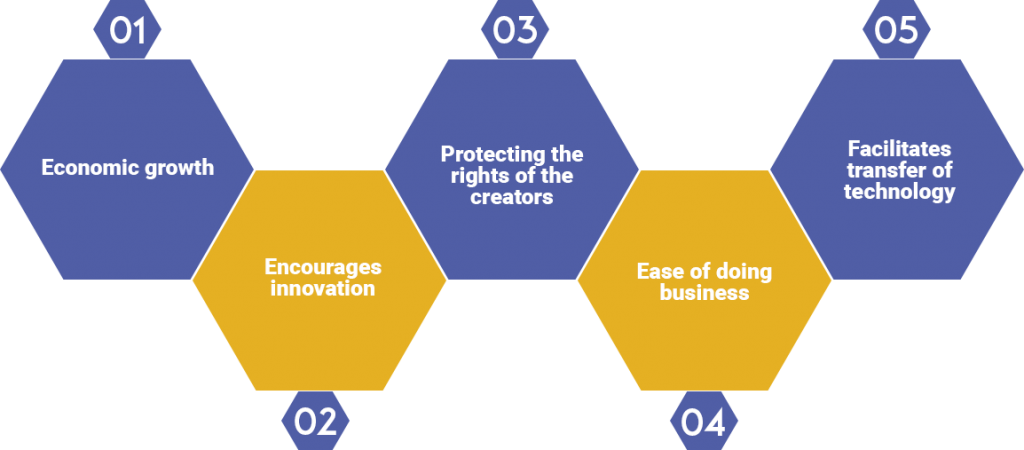Intellectual Property Rights for Business: An Overview

Japsanjam Kaur Wadhera | Updated: Feb 23, 2021 | Category: Copyright, Patent, Trademark
Intellectual property is a wider aspect in terms of intangible assets owned and legally protected by a person from being used by any other person without his/ her consent. It is a non- physical asset owned by a person. The idea of intellectual property rights relates to the fact that the particular products of human intellect that applies to physical property which is the tangible assets must be given protective rights. For a business to succeed, both the intangible and tangible assets play a very important role. Intellectual property being of such great importance for a business is required to be protected similar to the tangible assets. Therefore intellectual property rights (IPR) comes into play. This article will discuss about the intellectual property rights for business in India.
Table of Contents
What is Intellectual Property Rights?
The term intellectual property rights is related to the creations of the mind such as literature works, inventions, artistic pieces and etc. it is related to the creativity or invention done by a human. Various efforts in terms of input of skills, manpower, energy, time and money and etc is required to create or invent something new. The recognition and protection of such creativity and invention is done under the intellectual property rights. Patent, copyright, trademark, designs are considered as intellectual property.
IPR are the legal rights governing the use of creation and invention by human mind. These rights are defined in the Article 27 of the Universal Declaration of Human Rights which provides the right to benefit from the protection of moral and material interests resulting from authorship of literary, scientific or artistic productions.
The need and importance of intellectual property was first recognized in Paris Convention for the Protection of Industrial Property (1883) and the Berne Convention for the Protection of Literary and Artistic Works (1886). Both of the treaties are administered by the World Intellectual Property Organization (WIPO).
IPR are the territorial rights by which the owner of the creation or invention can buy, sell or license his intellectual property similar to physical property. Each type of IPR provides special rights to the creator and the inventor to sustain and get economic benefits which further motivates the skills.
Also, Read: Landmark Judgments on Intellectual Property Rights Law in India
Why is there a Need for Intellectual Property Rights in India?
The development and well-being of the humanity depends on its capacity to invent or create new works in cultural and technological areas. Some of the reasons why intellectual property rights are needed as follows:

Economic Growth
The protection of intellectual property encourages economic growth and creates job opportunities and enhances the standard of quality of life.
Encourages Innovation
The legal protection of new innovation and creations encourages the commitment of additional resources for more innovation.
Protecting the Rights of the Creators
Intellectual Property Rights protects and safeguard the creators of their intellectual goods and services by granting them certain time – limited rights to protect and control the use of their goods.
Ease of doing Business
Intellectual Property Rights promotes the creativity and innovation and ensures the ease of doing business.
Facilitates Transfer of Technology
Intellectual Property Rights facilitates the transfer of technology in the form of joint venture, foreign direct investment and licensing.
What is the Importance of Intellectual Property Rights for Business Strategies?
In the earlier times, the intangible assets were not given recognition for the development and success of the business. It was believed that it is the physical asset that results to the overall growth and development of business. However, through time with the advancement and increasing use of information technology and growing importance of information technology based products and upcoming service industry, the importance and value of intangible assets increased as compared to the physical asset of any corporation. The acquiring, creating and protecting intellectual property is as valuable as other tangible assets which can be traded in the market. And if the ideas are not legally protected by IPR, it can be easily getting copied and misused by the third party or rivalry without giving any benefit or credit to the real or original owner of the said intellectual property.
All businesses have a logo or trademark which helps to distinguish them from all the other businesses dealing in the same industry or segment. If such a trademark is protected legally under the IPR laws, it shall ensure that no other business or individual can use such a similar mark to carry out business in that same industry or segment.
Patent is a right which is exclusively granted for an invention made and is either a product or a process providing new ways to do something or new solution to an already existing issues or problems. Having an innovation or an invention legally patented provides an advantage to the business in the market as patent is a negative right which prevents or restricts an unauthorized third party from creating or using such patented process or product indirectly, providing the business a monopoly over such patented work.
Similarly, copyright provides protection to the businesses dealing in artistic and literary work. Any work of the business which is of literary, artistic, cinematograph, dramatic etc are protected by copyright.
Geographical indication is an intellectual property that is not granted to an individual but is granted collectively to some association of industries. It allows the industry to use the intellectual property by preventing any other organisation from using same marks for similar products.
Understanding Types of Intellectual Property Rights for Business

Trademark Act, 1999
The trademark law falls under the Trademarks Act, 1999. A trademark is a special symbol which helps to distinguish the goods offered for sale in the market by one business from another. This creates and establishes a link between the business and the product and portrays the quality and nature of the product. The main purpose of the trademark is to indicate the origin of the goods to which it is related to and used. It identifies the product, provides guaranteed quality and helps to advertise the product. It creates goodwill for a business.
Any sign or combination thereof which is capable of distinguishing the goods or services of the businesses is capable of creating a trademark. It may be a combination of name, logo, design, symbol, word, shape, colour, letter, number etc as well as any combination representing a graph. It is necessary to register a trademark so as to get protection from any sort of infringement by the outsiders. The trademark holder gets many legal rights and benefits under trademark registration. Further the trademark must be renewed from time to time by the business so as to continue the possession of trademark and the get the advantages associated with it.
Copyright Act, 1957
The Copyright Act 1957 states copyright laws which deal with
the protection and exploitation of the expression of ideas being in intangible
form. The law of copyright not only provides a legal framework for the
protection of beneficiaries of copyright, the individual writer, artist or
composer, but also the publication required for the creation of the work by
many cultural industries, recording and broadcasting industry, film, computer
and software industry etc.
Any original work being in literary, artistic, musical, dramatic, cinematic
films and sound recording are protected under copyright law. Also to be
protected under copyright law, the idea must be expressed in original form.
Copyright acknowledge both moral and economic rights of the owner of the original work. Copyright law also provide to use the original work of the owner of the copyright without his permission through the principle of fair use, which provides privilege to the others. By applying the doctrine of fair use, the copyright law creates a balance between public and private interests.
Patent Act, 1970
The patent law recognizes the exclusive right of a creator or inventor of the innovation to get commercial benefits from his invention. Under the Patents Act, 1970 a patent is a special right granted to the owner of an invention to use, manufacture and market the invention. The act also lays down certain conditions that an invention is required to meet or fulfil. Exclusive right means that no person can use or manufacture or mark an invention without the prior consent of the patent holder. However, this exclusive right to patent is only for a limited time period. The protection under patent law is given only for a period of 10 to 20 years.
To obtain patent protection, an invention must come within the scope of patentable subject and satisfy three statutory requirements of innovation, industrial application and inventive step. The invention must be novel. The novelty can be inferred by prior use or publication. Mere discovery of the invention cannot be patented. Patents are not allowed for any principle or idea.
The main purpose of patent law is to encourage new technology, scientific research and industrial progress. The economic value of the patent information is that it helps in providing technical information to the industry that may be used for the commercial purposes. Patent acts as an incentive for inventing new products and form integral part of a culture of innovation and growth.
Industrial Design
Industrial Designs Act, 2000 is one of the forms of IPR that protects the visual design of an object which is not completely or purely utilized. It consists of the creation of features of pattern, shape, ornamentation configuration or composition of lines or colours applied to any article in 2 or 3 dimensional forms or combination or one or more features. The design protection deals with the outer appearance of an article including shape, colour, article, decoration, texture and materials. In many countries, the industrial design must be registered to get protection under the Industrial Design Act, 2000.
Geographical Indication
Certain products are linked to a certain geographical location and producers may wish to get intellectual property protection to ensure that the products from the other areas do not misuse such indicator. It is a sign or a name used on certain products which relates to a geographical location or origin of the product. The use of the geographical indication acts as a certification that the products have a certain quality as per the traditional method.
Geographical indication performs three functions that are firstly, it identifies the origin or a particular region or locality of the goods. Secondly, it suggests to consumers that such goods come from an origin where a given quality, reputation or other characteristics of the goofs are of essential attribute to the geographic region and thirdly, it promotes the goods of the producers of a particular origin or region. It is necessary for a product to obtain its reputation and quality from that origin. Such properties are important and depended on the geographic location of production and a specific link exists between the product and the place of origin. The Geographical Indication is protected under the Geographical Indication of Goods (Registration and Protection) Act, 1999.
Reasons to protect Intellectual Property under Intellectual Property Rights
- To promote the development of creativity.
- To promote intellectual property and the ability to protect its results in economic growth and creating job opportunities.
- Encourages the creators of intellectual property to create additional intellectual properties.
- Without protection under intellectual property rights, the creator and inventor would get little incentive to pursue new ideas.
- The software companies, publishing companies and recording industries cannot exist without copyright protection.
Conclusion
It these recent times the economy is mostly driven by knowledge. Any type of business whether big or small relies on intangible assets for its survival and growth. The intellectual property rights not only provide protection to the creator or innovators for their creation but it also enhances the value of the company. Intellectual property rights for business are important to encourage new creations including technology, inventions, artwork etc. IPR increases the incentives for the business to continue to produce things that would further create job opportunities and new technologies and would enable the business to improve and evolve faster.
Also, Read: What are the Common Problems of Trademark Registration?














